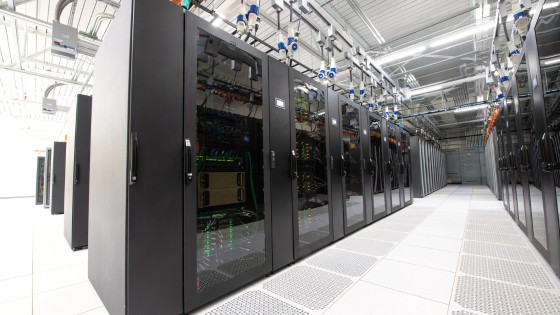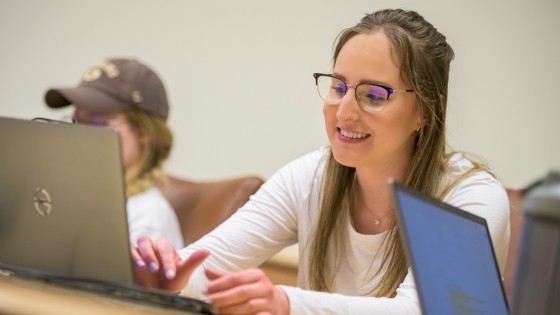Contact Us



Office of Admissions | Knight Hall 150
1000 E. University Avenue
Department 3435
Laramie, WY 82071
Phone: (307) 766-5160
Toll-Free: (800) 342-5996
Fax: (307) 766-4042
Email: admissions@uwyo.edu
Decoding Opportunities: The Power of a Computing Minor
Published August 08, 2023
By Cyber Joe

In today's digital age, the influence of technology is widespread and continually shaping our world. As industries rapidly evolve to foster the true impact of technology, the demand for individuals with a strong foundation in computing has skyrocketed.
Whether you're an aspiring artist, rancher, economist or historian, integrating a computing minor into your academic journey can be a game-changer. In this blog, we’re going to explore the compelling reasons why YOU should consider getting a computing minor at the University of Wyoming through the School of Computing (SoC).
One-of-a-kind resources
UW stands at the forefront of supporting research computing and data science with a diverse range of resources. Here, you'll be able to benefit from our existing facilities and services and be part of future growth opportunities as School of Computing continues to evolve. Just take a look at what you would have access to:
-
Advanced Research Computing Center (ARCC) - A hub for cutting-edge computational resources. See how you could generate and interpret massive datasets while studying molecular biology like genomics, transcriptomics and proteomics in a fraction of the time.
-
Center for Blockchain and Digital Innovation - Pioneering breakthroughs in blockchain and digital technologies. Whether you’re a business major or not, blockchain is reshaping sectors like healthcare, agriculture, transportation and intellectual property, and you have this resource on your campus!
-
Center of Innovation for Flow through Porous Media (COIFPM) - Pursing a major in energy engineering or environmental sciences? UW’s COIFPM stands as an invaluable hub, providing hands-on opportunities to engage with cutting-edge technologies shaping the future of the industry. With a $100+ million investment, COIFPM leads global research in oil, gas and green tech, revolutionizing energy and offering unmatched capabilities for multifaceted studies.
-
Coe Student Innovation Center - Nurturing student-driven innovation and creativity. Studying history? Immerse yourself in historical events using virtual reality to grasp the subject even tighter and witness events first-hand.
-
Cybersecurity Education and Research Center (CEDAR) - Leading the charge in cybersecurity research and education. Take your management studies to the next level by incorporating cybersecurity considerations into business strategies.
-
Data Science Center - A hub for harnessing the power of data through interdisciplinary collaboration. Interested in political science? Utilize the Data Science Center to analyze political campaigns, voter behavior and policy impacts based on data-driven insights.
-
Digital Scholarship Center - Fostering digital scholarship and exploration at the intersection of technology and academia. Many, if not all, majors can benefit from the digital technologies here. For example, if you’re studying religious studies, you can use these digital tools for analyzing religious texts, visualizing religious data and studying global religious trends.
-
Innovation Wyrkshop - Cultivating a culture of innovation and problem-solving. Utilize our 3D printer to create detailed scale models of buildings and structures for your next architectural project or create customizable garments for an apparel design class.
-
NCAR Wyoming Supercomputing Center (NWSC) - Contributing to high-performance computing and research. Take your geology and geophysics to the next level. Supercomputing can assist in simulating geological processes, such as seismic activity, tectonic plate movement and landform evolution.
-
NSF EPSCOR - Elevating research and educational capabilities through the National Science Foundation's EPSCoR program. Collaborate with EPSCoR and your Native American and Indigenous studies by addressing issues of cultural preservation, traditional knowledge and sustainability.
-
Secure Systems Collaborative - Advancing research and development in secure systems and technologies. Expand your criminal justice knowledge by taking advantage of this resource and learn about cyber threats, digital forensics and investigating cybercrimes.
-
Shell 3D Visualization Center - Unveiling new dimensions of visualization through state-of-the-art technology. Explore our 3-D brain model to better understand brain anatomy in your psychology and health sciences courses.
-
Wyoming Geographic Information Science Center (WYGISC) - Pioneering geographical information science research and applications. Dive deep into art history and use GIS to understand how art was influenced by and influenced the physical environment, architecture and cultural landscapes of different eras.
-
Wyoming NIH INBRE - Fostering biomedical research and collaboration through the National Institutes of Health INBRE program. Students studying nutrition and dietetics can engage in biomedical research related to diet’s impact on health, obesity, metabolic disorder and nutritional interventions.
-
Wyoming Water Resources Data System (WRDS) - Leveraging data for a deeper understanding of water resources. See how you can elevate your modeling, analysis and decision-making in your civil engineering classes with access to data about water levels, flow rates, rainfall and water quality.

Cross-Disciplinary Advantage
One of the most significant benefits of pursuing a computing minor is the ability to bridge the gap between technology and your major. The infusion of computing knowledge into your future career path can lead to innovative solutions, enhanced research methodologies and new perspectives.
At UW, not only are you going to learn from a multitude of professors from across the university, but you’re going to get hands-on experience and learn about a range of basic and advanced computing topics. This will ensure you’re getting the most out of your minor and are able to apply it to your studies. For instance, a music major with a computing minor might learn to use music notation software to blend two genres of music while an anthropology major might use geographic information systems (GIS) mapping software to create ancient civilization maps.
Become the Top Prospect for a Job
Incorporating a computing minor into your academic journey significantly expands your career horizons. Whether you're interested in healthcare, finance, marketing or any other sector, a computing minor can provide you with a competitive edge. Employers value candidates who can navigate and contribute to technology-driven projects, making you a more attractive prospect.

Come with Receipts (Data)
In an era characterized by data overload, the ability to understand, analyze and interpret data has become a prized skill. A computing minor can equip you with the tools to manipulate and make sense of data, enabling you to draw meaningful insights. This data literacy can help you make informed decisions and back up your arguments with solid evidence.
Make your Inventions a Reality
Entrepreneurship thrives at the intersection of creativity and technology. A computing minor can empower you to transform your innovative ideas into reality. With a foundational understanding of programming, software development and digital tools, you'll be better equipped to bring your concepts to life, whether it's a revolutionary app, a sustainable product or a digital platform that addresses a real-world problem.
If you're interested in starting a business, we also have an entrepreneurship minor you can tack on to your degree plan!
Level Up your Problem Solving
Digital technology knowledge is only going to give you an edge and structured approach to problem-solving, a skill that pushes boundaries and makes you more marketable.
Learning how to break big problems into smaller parts and coming up with step-by-step solutions helps you learn important skills that can be useful in many different areas. This systematic approach to tackling challenges can make you a more efficient and effective problem solver in both your academic and professional pursuits.

Incorporating a computing minor into your academic journey isn't just about learning to code; it's about gaining a set of skills that can transform the way you think, solve problems and contribute to the world. As digital technology continues to shape every aspect of our lives, the demand for individuals who can bridge the gap between technology and other domains will only grow. By pursuing a computing minor, you're opening doors to a world of opportunities, making you a more well-rounded, adaptable and competitive professional. So, whether you're majoring in the arts, sciences, humanities, or business, consider the computing minor as a powerful tool to unlock your potential.
Contact Us



Office of Admissions | Knight Hall 150
1000 E. University Avenue
Department 3435
Laramie, WY 82071
Phone: (307) 766-5160
Toll-Free: (800) 342-5996
Fax: (307) 766-4042
Email: admissions@uwyo.edu
